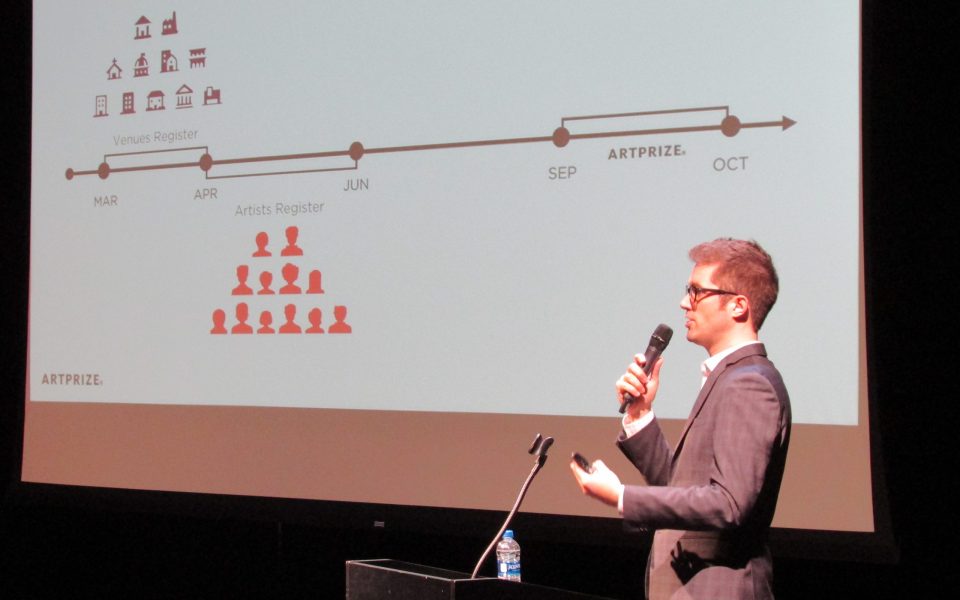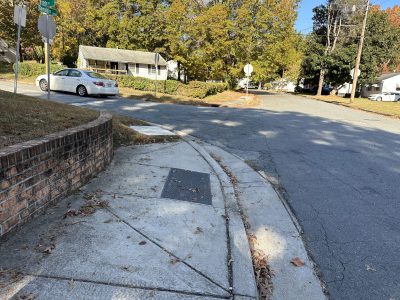The Arts Council of Winston-Salem & Forsyth County announces a goal of $2.5 million for its 2018 annual fundraising campaign while looking to Grand Rapids, Mich. for inspiration to reinvent the City of Arts and Innovation.
Considering that the Arts Council of Winston-Salem & Forsyth County fell short of its fundraising goal by $400,000 last year and had to make cuts to most of its constituent organizations, it might be intuitive to look to Grand Rapids for inspiration.
The arts council in Grand Rapids, a city in southwest Michigan that is slightly smaller than Winston-Salem, announced in the depths of the Great Recession that it was disbanding. While its official arts organization was folding, the underground arts scene continued to thrive, and the renowned ArtPrize festival was building momentum.
ArtPrize was founded in 2009 by Rick DeVos, who is the son of US Education Secretary Betsy DeVos, and the festival receives funding from DeVos family foundations and Amway, the source of the family’s wealth. Betsy DeVos has attracted controversy as education secretary because of her longstanding support for charter schools, which critics view as undermining public education. Betsy DeVos’ brother, Erik Prince, founded the international security firm Blackwater USA, since renamed Academi.
The 19-day ArtPrize festival showcases art in museums, bars, laundromats, auto shops and vacant storefronts, and awards a $200,000 prize by public vote and another $200,000 prize by jury. With 500,000 visitors, ArtPrize has won distinction as the biggest art event in the world two out of the three past years, with the exception of one year when it came in second place to an event organized by the artist Christo.
The Arts Council of Winston-Salem & Forsyth County, which is seeking new models for financial sustainability and community engagement, brought Kevin Buist, exhibitions director for ArtPrize, to Winston-Salem on Monday. Buist gave the keynote speech as part of the arts council’s inaugural Creative Conversations Network Series speaker in tandem with the launch of its 2018 annual fundraising campaign.
“A lot of it is the concern about the community going through different levels of change,” arts council President and CEO Jim Sparrow said. “Grand Rapids went through a lot of change 10 years ago. We want to reinvent ourselves. What they did in Grand Rapids was really disruptive in a good way.”
Sparrow also said the arts council is “exploring a greater role for festivals as part of our Winston-Salem arts strategy.”
ArtPrize draws a lot of its energy from the clash between professional juried assessment of art and popular acclaim. Buist said the two $200,000 prizes are drawn from the same pool of art, but each contest is designed with a sense of purity: The juried contest is strictly juried, while the popular contest is strictly determined by popular vote.
“The reason we designed it that way is that we want there to be a positive sense of friction and tension between these two approaches,” Buist said. “And if you are familiar with ArtPrize at all or the history of ArtPrize, you’ll know that what the jury picks and what the public pick couldn’t be more different. The jurors are people — they’re like art experts, right? They’re like critics and curators and people really at the top of the field. They’re totally tuned in to art history as well as the current moment and the current conversation in contemporary art. The public, on the other hand, they’re just wandering around, and whatever’s catching their eye and thrilling them, they’re voting for. And the public, just by nature because it’s 40,000 people or whatever voting, they can’t be intentional. They can’t be editorial. It’s just an accumulation of whatever people happen to like.”
Buist said ArtPrize instigates intense debates over art in Grand Rapids, and organizers model the practice by hosting a panel discussion on the city’s local NBC affiliate.
“These are incredibly politically charged times, right?” Buist said. “Like, we’re having a hard time, in Michigan I know, and I think here as well — it’s really hard to reach across the aisle. It’s hard to find common ground. It’s hard to find productive and civic spaces to have difficult conversations. But art can do that. Art is sort of this third thing. Like, art doesn’t really matter, but that’s why it’s the perfect thing to argue about.
“Art is like a way of encoding values, right?” he continued. “To make something means that you’re encoding your values into that object and into that image. And to like something is to see your own values reflected in it. And so, when we have the arguments about what art is good and why, we get to the core of what makes us human, and we get to something more fundamental than politics, and it becomes like this safe space to have really difficult conversations.”
Buist said a public vote is “not the best way to find the best art,” but that’s not the point.
“The idea of the public vote more than anything is to communicate to the audience that they matter to the process,” he said. “They matter to art. Normally, the marketing challenge for a museum is to say, ‘Hey we have art; it matters. Our mission is to protect it forever. How can we convince people that art matters so they will come in to see?’ We’ve reversed that, and instead what we do is we have no building, we have no collection, the museum is everywhere; it’s the whole city. Our message to the audience is not, ‘Hey, art matters and you should care about it.’ Our message to the audience is, ‘You matter to this whole process, and without you, it all falls apart.’”
Buist’s presentation — simultaneously relaxed and high-energy with good visuals, much like a TED talk — at Hanesbrands Theatre so dazzled the audience that the announcement of the two annual campaign co-chairs, Cheryl Lindsay and Bill Benton, seemed almost like an afterthought. The arts council set a fundraising goal for 2018 of $2.5 million — down from the $2.81 million target the previous year.
Acknowledging the challenge, Benton joked in an interview that he agreed to co-chair the campaign out of “abject stupidity.”
“I’ve been a supporter of the arts council for a long time, and I didn’t have the heart to turn Jim down,” said Benton, who is the CEO of Salem Senior Housing.
Benton’s co-chair, Hanesbrands Human Resources Director Cheryl Lindsay, issued a tantalizing challenge: Anyone who makes a pledge or contribution to the community fund before midnight on Wednesday will be eligible for a raffle to win an all-expenses paid trip to ArtPrize in September.
Join the First Amendment Society, a membership that goes directly to funding TCB‘s newsroom.
We believe that reporting can save the world.
The TCB First Amendment Society recognizes the vital role of a free, unfettered press with a bundling of local experiences designed to build community, and unique engagements with our newsroom that will help you understand, and shape, local journalism’s critical role in uplifting the people in our cities.
All revenue goes directly into the newsroom as reporters’ salaries and freelance commissions.





Leave a Reply